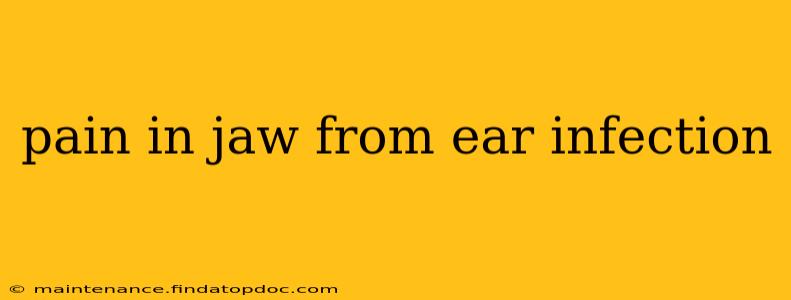Ear infections, while often associated with earache, can sometimes cause pain that radiates to the jaw. This isn't uncommon, and understanding the underlying reasons can help alleviate concerns and guide appropriate treatment. This article explores the link between ear infections and jaw pain, offering insights into the causes, symptoms, and effective management strategies.
Why Does My Ear Infection Cause Jaw Pain?
The connection between ear infections and jaw pain stems from the intricate anatomy of the head and neck. The structures within the ear are closely linked to the temporomandibular joint (TMJ), the joint connecting your jaw to your skull. Inflammation and infection in the middle ear can, in some cases, spread or refer pain to surrounding areas, including the jaw. This referred pain is a sensory phenomenon where pain originating in one area is felt in another.
The nerves that innervate the middle ear and the TMJ are interconnected, creating a pathway for pain signals to travel from the infected ear to the jaw. The close proximity of these structures further facilitates this phenomenon. Pressure buildup within the middle ear due to infection can also contribute to the feeling of jaw pain.
What are the Symptoms of an Ear Infection Causing Jaw Pain?
Experiencing jaw pain alongside typical ear infection symptoms is a strong indicator of the connection. These symptoms can include:
- Earache: This is the most common symptom of an ear infection, often described as a sharp, throbbing pain inside the ear.
- Jaw Pain: This can range from mild discomfort to severe, sharp pain, usually felt in the jaw on the same side as the infected ear.
- Feeling of Fullness in the Ear: A sensation of pressure or fullness in the affected ear.
- Hearing Loss: Temporary hearing loss is often associated with ear infections.
- Fever: Fever is a common symptom, particularly in children.
- Drainage from the Ear: Pus or fluid draining from the ear.
- Headache: In some cases, the infection can also lead to headaches.
- Facial Swelling: In severe cases, swelling may occur on the affected side of the face.
Can a Toothache Be Mistaken for Ear Infection Jaw Pain?
Yes, jaw pain associated with an ear infection can easily be confused with a toothache. Both conditions can present with similar symptoms, like pain in the jaw and potentially referred pain to the ear. Distinguishing between the two requires a careful assessment of other symptoms. If you experience earache, hearing loss, or drainage from the ear alongside jaw pain, an ear infection is more likely. A dentist or doctor can provide a proper diagnosis.
How is Jaw Pain from an Ear Infection Treated?
Treatment for jaw pain stemming from an ear infection focuses on addressing the underlying ear infection. This usually involves:
- Antibiotics: If the ear infection is bacterial, antibiotics are typically prescribed to combat the infection.
- Pain Relievers: Over-the-counter pain relievers, such as ibuprofen or acetaminophen, can help manage both ear and jaw pain.
- Decongestants: Decongestants can help alleviate pressure buildup in the middle ear.
In some cases, a doctor might recommend ear drops or other treatments to address the infection. It is crucial to seek medical attention for a proper diagnosis and treatment plan to avoid complications.
When Should I See a Doctor for Jaw Pain and Ear Infection?
It's important to consult a doctor if you experience jaw pain alongside any ear infection symptoms. Delaying treatment can lead to complications such as spread of infection, hearing loss, or other health issues. Seek immediate medical attention if you experience:
- Severe ear or jaw pain.
- High fever.
- Swelling of the face.
- Dizziness or vertigo.
- Any signs of severe illness.
Prompt diagnosis and treatment are key to resolving both the ear infection and associated jaw pain.
